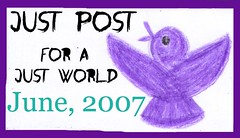An interesting article by Mary Mitchell at the Chicago Sun-Times discussing how the crusade to find Nailah was different from other cases of missing black women.Crusade to find missing Nailah made us care
Black families push to get coverage of disappearances
October 2, 2007
BY MARY MITCHELL Sun-Times Columnist
The relatives of Nailah Franklin are living a family's worst nightmare. Last Friday, an unclothed body that was discovered in the Calumet Woods was identified as the 28-year-old Franklin. With her fashion model looks, Franklin has been described as the "star" of her close-knit family.
Franklin was reported missing Sept. 19.
Like most parents, I worry about my adult daughters because, unfortunately, there is too much mayhem in the world. I don't think my family is much different from a lot of others.
And while every missing person is neither pretty or even lovable, if someone we love goes missing, we want police to turn over every stone. We want our friends and our neighbors to fan out across the city and join in the search. We want that person's face plastered on national news programs as well as in the local papers.
She was not seen in the same light
Yet, too often when young black women disappear, none of those things happen without the family waging a crusade.
These relatives have to scuffle to get alerts posted, and when the police department distributes the alert, it is still a fight to get the notice in a newspaper.
Franklin's disappearance didn't follow that pattern for several reasons.
First, she was a very attractive black woman who came from a middle-class background.
As such, her disappearance didn't get typecast as a throwaway. Franklin wasn't seen in the same light as the troubled black women who walked the streets in neighborhoods like Roseland and Englewood and ended up being found dead in abandoned buildings without anyone knowing they were missing.
Neither was Franklin's disappearance viewed in the same way as law enforcement views the average teenage runaway. Although many of the parents and guardians of these young people do their best to get media attention, their pleas are routinely ignored. And while police will pick up runaways if they happen to bump into them, they don't make it a priority to locate teens who bolt from their homes.
Franklin's relatives and friends made sure her plight was not ignored. Her sister, Lehia Franklin Acox, used her media contacts to ensure that photographs of her missing sister were widely circulated. For consecutive days, Nailah's beautiful smile graced the front pages, while updates of the search aired regularly on national news programs.
This is a significant change from just four years ago.
When Nancie Walker, a Chicago businesswoman, disappeared in 2003, her family and friends had to pressure the Chicago Police Department to investigate the disappearance as a possible abduction even though Walker was not known to take off without letting anyone know of her whereabouts.
Three months after vanishing, Walker's dismembered body was found in plastic bags. No one has been charged with that crime.
The way Nailah Franklin's disappearance was handled -- not just by the police but by the media -- shows that black families now are more aggressive about getting the media's help.
Because of the Franklin family's efforts, I saw the face of Nailah Franklin so often, I began to feel as if I knew her. And just as the faces of two other missing persons -- Laci Peterson and Natalee Holloway -- were etched into our consciousness through media exposure, by the time Franklin's body was found 10 days after she disappeared, many of us were genuinely moved by the tragedy.
It is a tragedy, but also a blessing that Franklin has been humanized in a way that so many missing black women have not been.
Case can't be dismissed
From her sisters, we learned that Franklin was someone who brought incredible joy to their lives. From her employers, we learned that the young professional was so well-respected in the workplace that her unscheduled absence was cause for alarm.
During days of waiting, we learned that Franklin had a spiritual family, that she had career goals and that she was a real role model for her younger relatives.
Nailah Franklin's family made sure there would be no presumptions. People who loved Franklin made sure that her disappearance wouldn't be dismissed as just another act of random violence.
No missing person should get less than that.
Friday, October 5, 2007
Crusade to find missing Nailah made us care
Posted by Regina at 8:28 AM
Labels: black, Mary Mitchell, missing, Nailah Franklin, woman
Subscribe to:
Post Comments (Atom)





No comments:
Post a Comment